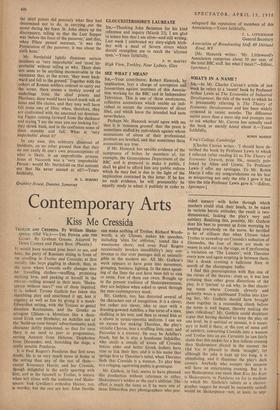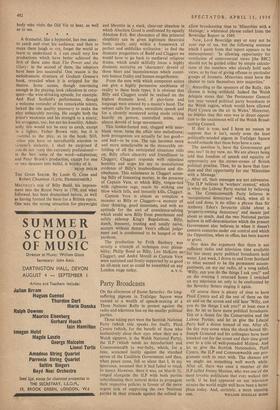Contemporary Arts
Kiss Me Cressida
TROILUS AND CRESSIDA. By William Shake- speare. (Old Vic.)—THE POWER AND THE GLORY. By Graham Greene. Adapted by Denis Cannan and Pierre Bost. (Phoenix.) IT would have warmed your heart to see, and hear, the party of Russians sitting in front of me revelling in Troilus and Cressida; at first timidly, like boys giggling in church; then, in the scene where Cressida sadly changes into her travelling clothes—snuffling, protesting undying love, and peeking at herself in the mirror—rolling around in their seats. 'Shake- speare without tears?' one of them inquired. 1t is, indeed. Tyrone Guthrie has taken this shambling play and smartened it up, lent it cogency as well as fun by giving it a mock- Edwardian setting, with the Trojans as genial dissolute Ruritanians, and the Greeks as arrogant Uhlans—a Menelaus like a desic- cated Erich von Stroheim; an Achilles out of the 'build-up-your-biceps' advertisements; each character deftly pinpointed, so that for once there is no need to peer at programmes, sorting Antcnor from Helenus, Deiphobus from Diomedes; and, bestriding the stage, a really notable Pandarus.
It is Paul Rogers's Pandarus that first sows doubt. He is so very much more at home in the setting than any of the rest of them— except Rosemary Harris; and her Cressida, though delightful in the early sparring with him, and in the farewell to Troilus, is uneasy when left alone with the audience and Shake- speare. Jack Gwillim's orthodox Hector, too, is worthy; but the rest are lost. John Neville can make nothing of Troilus; Richard Words- worth, a sly Ulysses, makes his speeches, including 'alms for oblivion,' sound like a wearisome chore; and even Paul Rogers occasionally invokes inaudibility's lazy con- nivance to slur over passages dull or unintelli- gible to the modern ear. All Mr. Guthrie's work appears to have gone into movement, grouping, business, lighting. In the mere speak- ing of the lines the cast have been left to sink or swim. Few of them can swim. Brought up in the present tradition of Shakespeareanese, they are helpless when asked to speak through the near-contemporary mask.
Mr. Guthrie, too, has .distorted several of the characters out of recognition. It is a clever, but rather too clever, idea to start with a dressing-gowned Achilles, a fine torso of a man, skulking in his tent, and then to reveal him as a clown in comic-operetta uniform. I can see no excuse for making Thersites, the play's vitriolic Chorus, into a scuffling little runt; and Patroclus is a travesty. He may be Achilles's brach, but he is also a handsome ladykiller, who steals a couple of kisses off Cressida before older and better Greek lechers have time to lick their lips; and it is his name that springs first to Thersites's mind, when Thersites finds that Cressida is a wanton. To play him as a cringing, squirming pathic is grotesque.
Mr. Guthrie, in fact, seems to have planned this production without reference to either Shakespeare's wishes or the cast's abilities. The effect is much the same as if he were one of those Edwardian pier photographers who pro-
vided scenery with holes through which mashers could stick their heads, to be taken in various heroic attitudes; the result is two- dimensional, lacking the play's very real subtlety. Realising this, possibly, Mr. Guthrie does his best to prevent us from worrying by keeping everybody on the move. So terrified is he of stillness that when Ulysses takes Troilus to eavesdrop on Cressida's seduction of Diomedes, the four of them are made to weave in and out on the stage, as if performing a variation on 'The Lancers'; with Thersites every now and again erupting in between them, like a drunk crossing a ballroom floor in search of the champagne buffet.
I find this preoccupation with flux one of the curses of the theatre : even so, it was less irritating than other gross distortions of the play. Is it 'purism' to ask why, in that charm- ing scene where Cressida cleverly and patiently woos a spellbound Troilus into kiss- ing her, Mr. Guthrie should have brought them together in a resounding clinch before the scene is well begun, thereby making the lines ridiculous? Mr. Guthrie could doubtless argue that having decided to keep the play on one level, be it satirical or sensual, it is neces- sary to hold it there, at the cost of sense and of subtlety, converting Cressida into a wanton and Troilus into an ass. Certainly he can fairly claim that this makes for a less tedious evening than Shakespeare played in the manner the Old Vic is pleased to think 'straight'; for although the joke is kept up too long, it is stimulating, and it illumines the play's dark corners. Anybody who accepts this premise will have an entertaining evening. But it is not Shakespeare, any more than Kiss Me Kate is Shakespeare, or Pandarus on Ice (a medium to which Mr. Guthrie's talents as a choreo- grapher suggest he would be eminently suited) would be Shakespeare—not, at least, to any- body who visits the Old Vic to hear, as well as to see.
* * «
A dramatist, like a hypnotist, has two aims: to catch and rivet his audience, and then to make them laugh or cry, forget the world or learn to understand it. I can recall very few productions which have better achieved the first of these aims than The Power and the Glory: in the second of them, the adaptors have been less successful. One reason is the melodramatic structure of Graham Greene's book, revealed when it is stripped for the theatre. Some scenes, though convincing enough in the playing, look ridiculous in retro- spect—the wine-drinking episode, for example. And Paul Scofield's performance, though a welcome reminder of his remarkable talents, lacked the one quality necessary to make the play unbearably moving. He caught both the priest's weakness and his strength to a nicety; his arrogance, too; but not his humility. Admit- tedly this would not be easy to catch, except in a lighter, Father Brown vein; but it is .‘sential to the play, as to the book. Still. alleys you have an ineradicable aversion to Greene's dialectic, I shall be surprised if you do not •ajoy this extremely professional— in the best sense of the word—adaptation; and Peter Brook's production, except for one or two descents into ballet, is worthy of it.
BRIAN INGLIS











































 Previous page
Previous page